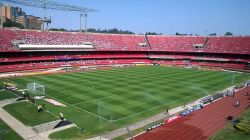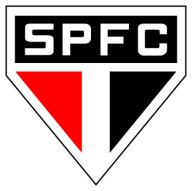Estadio Cicero Pompeu de Toledo, widely known as Morumbi (Brazilian Portuguese: [moɾuˈbi]), is a football stadium located in the eponymous district in Sao Paulo, Brazil. It is the home of Sao Paulo Futebol Clube and its formal name honors Cicero Pompeu de Toledo, who was Sao Paulo Futebol Clube's chairman during most of the stadium construction and died before its inauguration. Morumbi is the largest privately owned stadium in Brazil. The stadium was designed by the architect Joao Batista Vilanova Artigas.
History
In the early years of its existence, Sao Paulo Futebol Clube used for their headquarters and home field the Chacara da Floresta, located beside the Ponte das Bandeiras next to the Tiete river in the center of Sao Paulo. For this reason, the first incarnation of the club, that existed from 1930 to 1935, is referred to as "Sao Paulo da Floresta".
When the club was refounded in December 1935, since the Chacara da Floresta now belonged to Clube de Regatas Tiete, which had absorbed the original Sao Paulo Futebol Clube, the refounded Sao Paulo didn't have its own field. From 1936, it began to rent the Antonio Alonso stadium, which then belonged to Clube Atletico Paulista. In 1938, after merging with Estudantes Paulista (originated in 1937 by the merger of Estudantes de Sao Paulo and Paulista) Sao Paulo acquired the Antonio Alonso. When the Estadio do Pacaembu was inaugurated in 1940, Sao Paulo began to use it as a home field. the Antonio Alonso stadium was sold to Juventus in 1942.
In 1944, Sao Paulo bought a piece of ground called Caninde, which was only used as a headquarters and training location. The area was too small for the construction of a large stadium, so studies were done to find another home within the city of Sao Paulo.
In 1952, Sao Paulo's chairman Cicero Pompeu de Toledo requested from the city's mayor, Armando de Arruda Pereira, a groundplot in the Ibirapuera neighborhood. The mayor refused the request, but donated a groundplot in the Morumbi neighborhood
This page also has a version in other languages : Морумби Стадион (russian)

